Agenda Item 2 General Debate: Presentation of the written update on the implementation of HRC Resolution 30/1 by the High Commissioner for Human Rights pursuant to HRC resolution 40/1, OHCHR Report on ‘Promoting reconciliation, accountability and human rights in Sri Lanka’ (A/HRC/43/19)
27 February 2020
Statement by Hon. Dinesh Gunawardena, Minister of Foreign Relations, Skills Development, Employment and Labour Relations of Sri Lanka
Madam President,
Madam High Commissioner,
Members of the HRC and Delegates to the 43rd Session of HRC,
Ladies and gentlemen,
As this Council deliberates on the written update presented by the High Commissioner on progress regarding the implementation of HRC Resolution 30/1, I wish to reiterate that Sri Lanka remains committed to engaging with the High Commissioner and her Office in achieving sustainable development, peace and reconciliation, within the national framework overwhelmingly approved by the people of Sri Lanka during the Presidential Election last November, where President Gotabaya Rajapaksa was elected with an overwhelming majority.
Yesterday, the Government of Sri Lanka, at the High Level Segment made clear it’s position with regard to HRC Resolution 30/1, particularly, its decision to withdraw from co-sponsorship of Resolution 40/1 of March 2019, which also incorporates and builds on preceding Resolutions 30/1 of October 2015 and 34/1 of March 2017.
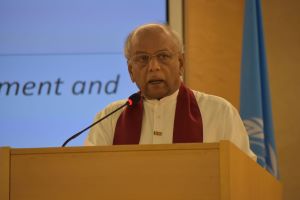
43rd Session of the Human Rights Council – High Level Segment
Madam President
Madam High Commissioner
Ladies and gentlemen,
As this Council is aware, in November 2019, the people of Sri Lanka gave a resounding mandate to President Gotabhaya Rajapaksa, to pursue a policy framework aimed at achieving the “four-fold outcome of a productive citizenry; a contented family, a disciplined, a just society and a prosperous nation”[1]. It is envisaged to achieve sustainable development and peace in the country, firmly anchored in safeguarding “national security without compromising the democratic space available to our people”[2].
It was over a decade ago, on 18 May 2009, that Sri Lanka defeated LTTE terrorism militarily, bringing to an end three decades of conflict and suffering. The end of the brutal conflict advanced, secured and protected one of the fundamental human rights – the ‘right to life’ for all Sri Lankans- Sinhalese, Tamil, Muslims and others. I would like to state with pride that since May 2009, not a bullet has been fired in the name of separatist terrorism in Sri Lanka.

Minister of Foreign Relations, Skills Development, Employment and Labour Relations – Dinesh Gunawardena who leads the Sri Lanka delegation to the 43rd Session of the Human Rights Council arrived in Geneva a short while ago.
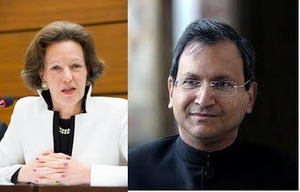
Ahead of the upcoming 43rd Session of the Human Rights Council (HRC) scheduled to commence next Monday (24 February), Foreign Secretary Ravinatha Aryasinha briefed the President of the HRC Ambassador Elisabeth Tichy-Fisslberger on the decision of the Government of Sri Lanka to withdraw its co-sponsorship of Resolution 40/1 of March 2019 on ‘Promoting reconciliation, accountability and human rights in Sri Lanka’, which also incorporates and builds on preceding Resolutions 30/1 of October 2015 and 34/1 of March 2017.
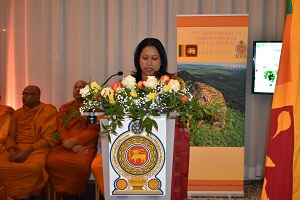
The Permanent Mission of Sri Lanka to the United Nations (UN) and the World Trade Organisation (WTO) in Geneva marked the 72nd anniversary of Sri Lanka’s independence at a solemn ceremony held on 4 February 2020 at the World Intellectual Property Office (WIPO) premises in Geneva.
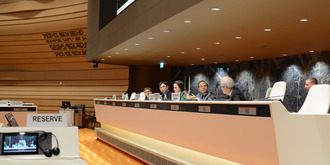
Ambassador A.L. Abdul Azeez, Sri Lanka’s Permanent Representative to the United Nations Office at Geneva recently chaired a panel at the Debt Management Conference organized by the United Nations Conference on Trade and Development (UNCTAD). This conference, which is organized every two years by the UNCTAD provides a regular forum for sharing experiences and exchanging views between Governments, international organizations, academia, the private sector, and civil society on current issues in public finance, debt management and the debt crisis prevention.
This year’s Debt Management Conference brought together senior-level national and international debt managers and experts from around the world to discuss some of the most pertinent topics in both external and domestic debt, debt management and public finance.
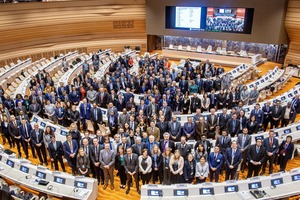
Sri Lanka's Permanent Representative to the UN in Geneva Ambassador A.L.A. Azeez takes over the Chairmanship of the 2020 States Parties' Meeting from Ambassador Yann Hwang of France, the outgoing Chair.
Sri Lanka's chairmanship, as the Convention marks 45 years of its entry into force next year and as the State Parties convene throughout 2020 a series of expert meetings and preparatory meetings building up towards the Ninth Review Conference in 2021, is highly significant for strengthening international cooperation and assistance to fully realise its objectives alongside universalisation and sustained focus on national implementation.
The Convention on the Prohibition of the Development, Production and Stockpiling of Bacteriological (Biological) and Toxin Weapons and on their Destruction, popularly known as Biological Weapons Convention (BWC) prohibits biological and toxin weapons through their entire cycle, and is a key element in the international community’s efforts to address the proliferation of weapons of mass destruction and States Parties’ endeavours to improve national security in an increasingly volatile global environment.
Permanent Mission of Sri Lanka
6th December 2019
Geneva
- Sri Lanka awarded as “A place of charm that works towards the future” at IVIAGGIATORI in Switzerland in November 2019
- Statement by Sri Lanka at CCW Meeting of High Contracting Parties 13 November 2019
- Policy of ‘Leave No One Behind’ in development must resonate at all levels, Sri Lanka tells WHO Heath Forum

